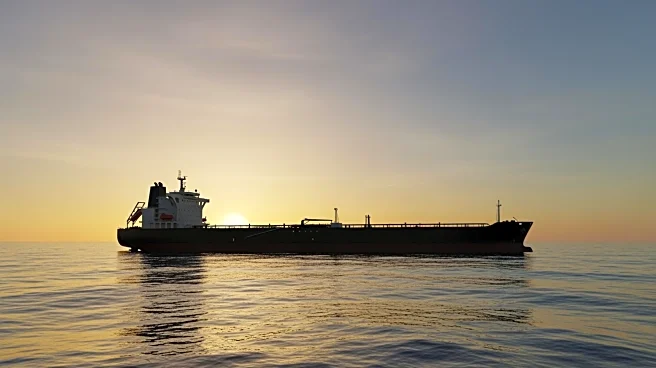What's Happening?
Iran has released a Marshall Islands-flagged tanker, the Talara, along with its 21 crew members, days after seizing the vessel without explanation. The tanker was captured by Iran's military as it traveled through the Strait of Hormuz, a critical passage
for global oil trade. The vessel's managers, Cyprus-based Columbia Shipmanagement, confirmed the crew's safety and stated that no allegations were made against the ship or its personnel. Ship-tracking data indicates that the Talara is now traveling away from Iran, and it appears that Iranian authorities offloaded its cargo of high sulphur gasoil before releasing it.
Why It's Important?
The seizure and subsequent release of the Talara highlight ongoing tensions in the Middle East, particularly concerning Iran's actions in the Strait of Hormuz. This area is vital for global oil trade, and disruptions can have significant impacts on international markets. The incident also reflects broader geopolitical issues, including Iran's strained relations with Western nations following the U.S. withdrawal from the 2015 nuclear deal. Such actions by Iran can exacerbate regional instability and affect global shipping routes, emphasizing the need for diplomatic solutions to prevent further escalations.
What's Next?
The release of the Talara may lead to diplomatic discussions aimed at reducing tensions in the region. However, the potential for future seizures remains, especially given Iran's history of targeting vessels in strategic waterways. International stakeholders, including the U.S. and European nations, may seek to engage with Iran to ensure the security of shipping routes and prevent further disruptions. Monitoring of the Strait of Hormuz will likely continue, with increased naval presence to safeguard commercial interests.
Beyond the Headlines
The incident underscores the strategic importance of the Strait of Hormuz and the potential vulnerabilities of global oil supply chains. It also highlights the complexities of international maritime law and the challenges in enforcing it in politically sensitive regions. The situation may prompt discussions on enhancing maritime security and cooperation among nations to protect critical trade routes.

















